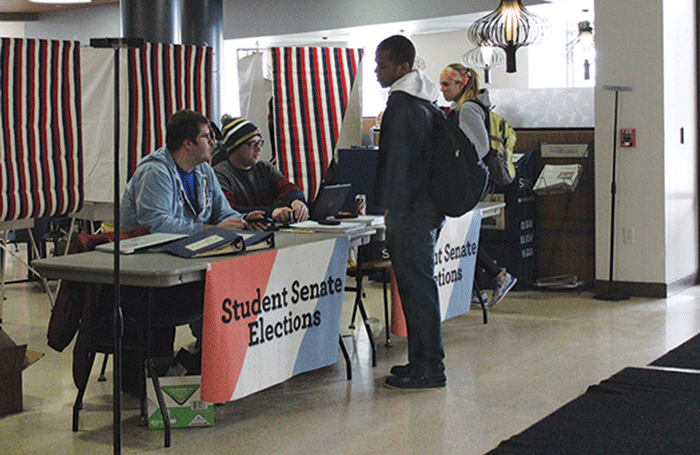A dynasty in the making
Sophomores Wrasse and Fish elected top Student Senators unopposed
Photo by FILE PHOTO
April 16, 2014
A coiffed blond mop and a gelled black one.
Samuel Fish and Jacob Wrasse are next year’s UW-Eau Claire student body president and vice president after collecting 393 votes in an uncontested election Monday, Tuesday and Wednesday.
Both are sophomores, which means they’ll have another shot at Student Senate’s leadership next year.
Fish and Wrasse sat down in The Spectator office Tuesday to lay out their priorities for the coming year.
Here’s where they stand on everything from frozen differential tuition, lawmaker lobbying and student apathy:
Blugold Commitment freeze
The Blugold Commitment is a charge on top of tuition that funds a slew of programs aimed at helping students graduate in four years, study abroad and claim seats in high-demand class sections.
Commitment charges were scheduled to reach the full $1,200-per student funding level by the start of this year. But a state tuition freeze passed with the Wisconsin biennial budget in July froze Eau Claire’s differential tuition at last year’s $900 level.
“Blugold commitment has become my baby,” Fish said. “I want to pursue every avenue we can to get differential tuition unfrozen.”
Student Senate leaders met with state lawmakers this year, lobbying to lift the freeze on Eau Claire’s differential tuition.
Other UW-System schools have differential tuition programs in place, but Eau Claire provost Patricia Klein, said at these schools, students don’t have much say in how their fees are spent.
At Eau Claire, students hold majority seats on committees that disperse student money. At other schools, administrators cast majority votes.
“It’s very, very different,” Klein said. “I don’t think people can appreciate the level of student involvement (at Eau Claire).”
Shared Governance
UW-System student representatives, usually the student body president and vice president from each UW school, meet five times a year to discuss statewide issues.
It’s basically one big Student Senate comprised of student governments from across the state.
“I’d like to see a bigger presence on our student representatives,” Fish said. “Other student governments look at our model and are kind of amazed.”
That’s because Eau Claire Senate controls a bigger chunk of student fees than many other UW-System school. At UW-Madison, about 90 percent of student fees are non-allocable, which means their student government doesn’t control how they’re spent.
At Eau Claire, only about 40 of percent student fees are non-allocable; Student Senate decides how to spend the other 60 percent of about $17 million in student money.
“People were saying ‘this is UW-Eau Claire, how can they have 60 percent allocable fees?’” Fish said. “We have a very powerful student government here, compared to other UW-System schools.”
Student reps also meet with state lawmakers and lobby on issues affecting students.
Wrasse was Senate’s intergovernmental affairs director this year.
He organized on-campus debates between City Council president candidates Monica Lewis and Kerry Kincaid. Wrasse also organized a pro-Confluence rally before the vote April 1.
Wrasse said he wants to see Senate continue to work with other governments on student and community issues. That means working on bike trail projects with the city and tracking Confluence Project progress on the state level.
Apathy and engagement
While Wrasse was visiting Arizona State’s campus last week, someone handed him a flyer trumpeting their student government’s role in doling out about $2.5 million in student fees.
“They’ve got almost 70,000 students,” Wrasse said. “We have 10 or 11,000 students and we allocate $17 million on their behalf.”
Next year students will pay about $450 — a $13 increase from this year’s seg fee level. Fish said he wants to keep student fees low, and make sure students know how much of their money Senate controls.
“We don’t want a student government that operates behind closed doors,” Fish said. “It’s irresponsible, and this is their money we are spending.”
Most Eau Claire students said Student Senate controls between $200,000 and $5 million in a survey last year, Wrasse said.
Students aren’t aware of how many programs Senate controls, and he wants to make it clear Senate funds $17 million in programs ranging from the Blugold Commitment to mobile printers, he said.
“I think because the process runs so smoothly,” Wrasse said,” Students do forget that it’s happening.”
Many students don’t know how their programs are funded, Wrasse said. So Senate will use it’s Public Relations Commission to put ads in public bathrooms and other places around campus.
He said he’d also like to see the Senate logo on student org websites.
“Which is not to take credit for that organization’s activities, but to let them know that if they believe this organization deserves more, if they have a question, we could be the ones to come to to make that happen,” Wrasse said.
But Fish said no matter how many engagement programs Senate sponsors, some students won’t tune in.
“Unfortunately we can only do so much as far as outreach goes,” Fish said. “If someone isn’t interested, we can’t make them interested.”



